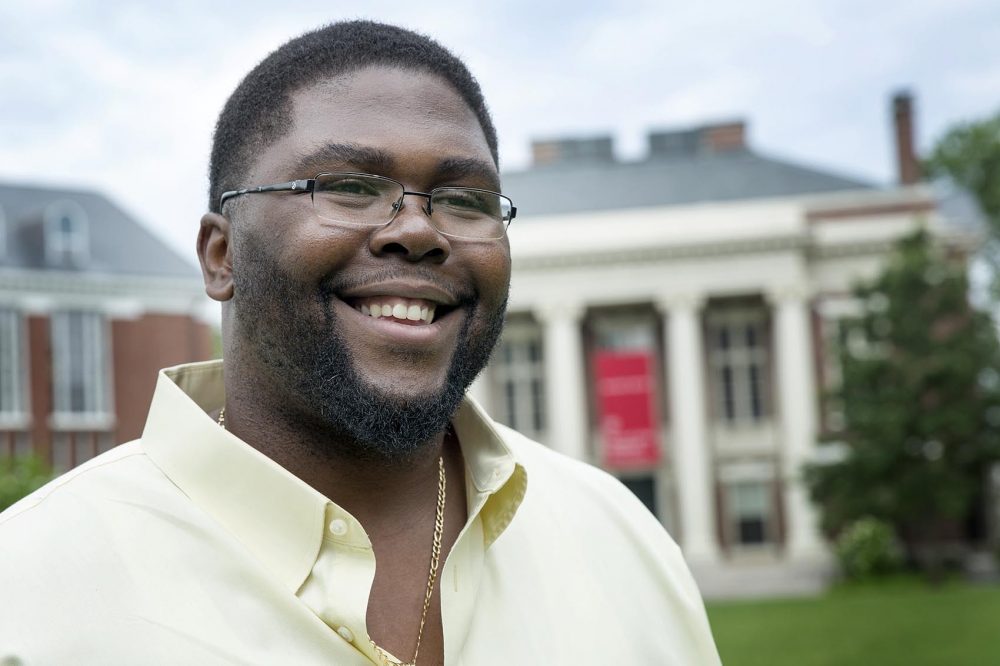Advertisement
Lessons Learned
'I'm Tired Of Justifying My Admissions Letter To People'
Resume
When you ask Anthony Jack about the moments in his education that stick out in his memory, he'll tell you there are many that shaped the way he thought of himself for years, but not in a good way.
Jack grew up with his mother, older brother and younger sister in Miami's Coconut Grove neighborhood, which he describes as "one you quickly drive your car through, not one that you park your car and have fun in."
Money was tight. His mom was the sole income earner. She worked as a school security monitor at a nearby middle school.
School was always a big part of Jack's life and he excelled in academics. Despite his success, Jack regularly felt a sense of doubt in his abilities from some key people around him.
Sometimes, it came from school staff.
In summer school, Jack said an administrator called him out for goofing around with friends before classes began. He remembered she said Jack didn't have the potential to be a student at the prestigious magnet middle school.
"Regardless of that context, she read me as a hoodlum," he said. "I didn't have the words to say, 'What are you basing that judgment on?' "
Jack has similar memories from high school. He switched to a private school for his senior year after receiving a full scholarship. There, Jack said, his peers regularly commented about his place at the prestigious school.
"Every time admissions comes up it’s like, 'You took a spot from a more well-qualified person. You got in because affirmative action,' " he remembered the students saying. "Or, 'Because they needed a black person, you got in.' "
The students weren't the only ones. Jack recalled one class, where he received a B on his first paper, and an A on the second. In the middle of class, in front of his peers, the teacher asked him to stand up.
"'Did you write this? Did anyone in the class help you write this?' " Jack remembered the teacher saying. "It was just one of the most humiliating academic experiences."
He argues moments like those teach students like him — low-income or students of color — not to celebrate themselves.
Like what you're reading? Get the latest education news (and other stories Boston is talking about) sent directly to your inbox with the WBUR Today newsletter. Subscribe here.
When you talk to Anthony Jack today, the last thing you'd think of is someone who hides in the shadows. He's a confident man who majored in religion and women's and gender studies at Amherst College and went on to become a junior fellow at Harvard University. He's now an assistant professor in the school's sociology department.
Jack said his spirit of self-advocacy can be traced back to a single, small moment during his days as an undergraduate at Amherst College.
He recalled sitting in a lecture hall listening to a panel discussion about the future of liberal arts education, led by then Amherst College president Anthony Marx.
When it came time for audience questions, Jack remembered an alum in the audience stood up and said, "'When I pick up The New York Times, when I pick up The Washington Post, I shouldn’t be reading about Amherst every time."
Jack explained, "What he was trying to get at was we are a college that doesn’t need to advertise. We shouldn’t be in popular media."
Jack's memory of Marx's response fundamentally changed his attitude toward how he approaches and shares his academic success.
He recalled Marx saying: "We should be unapologetic in how good we are at what we do. And if that means being unapologetically elite, then that’s what we should [be]."
Marx, who is currently the president of The New York Public Library, told WBUR that while he doesn't remember that specific moment at Amherst, it did sound possible.
The moment is seared in Jack's memory. Even though Marx was referring to the reputation of a liberal arts school, Jack felt the message also applied to his own struggle to feel proud of his skills and accomplishments.
"It was big moment for me because I — and many students of color, many women, people from non-traditional backgrounds — in these settings have always had to apologize or downplay our accomplishments," said Jack. "We had to be soft spoken so as not to upset someone who then would say we got in because of affirmative action."
He described that moment as a seed that grew into habit of self advocacy, which has been instrumental in building his career after undergrad. Jack said now, he doesn't feel the need to apologize for his successes — whether it's something small such as speaking at an event or larger like receiving an award or publishing a book.
"This is about really being proud of who you are," he said.
Is there a moment in your education that really stuck with you? We'd love to hear about it. Contact Edify reporter Carrie Jung.
This segment aired on February 25, 2019.
